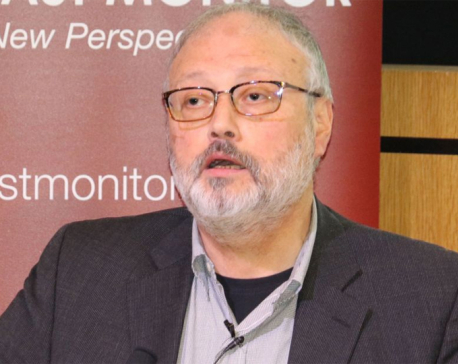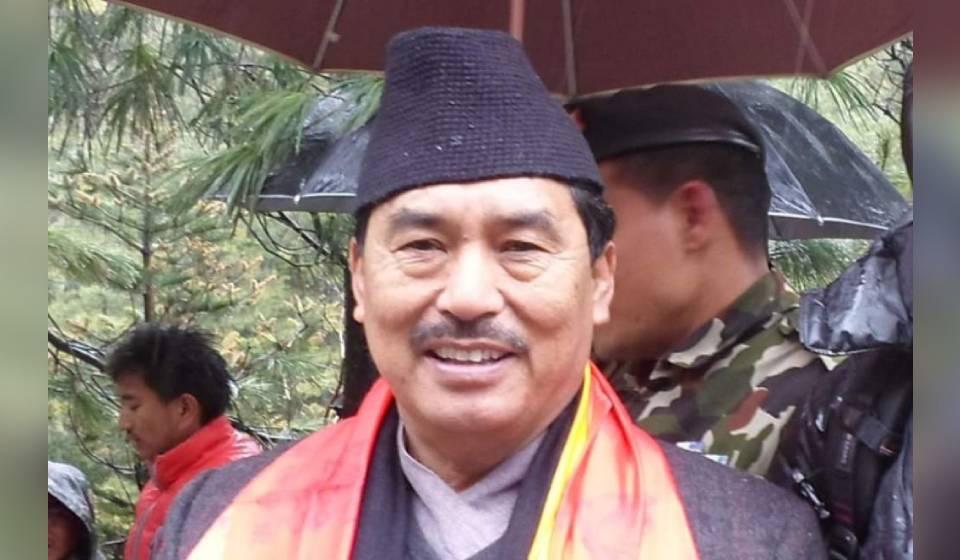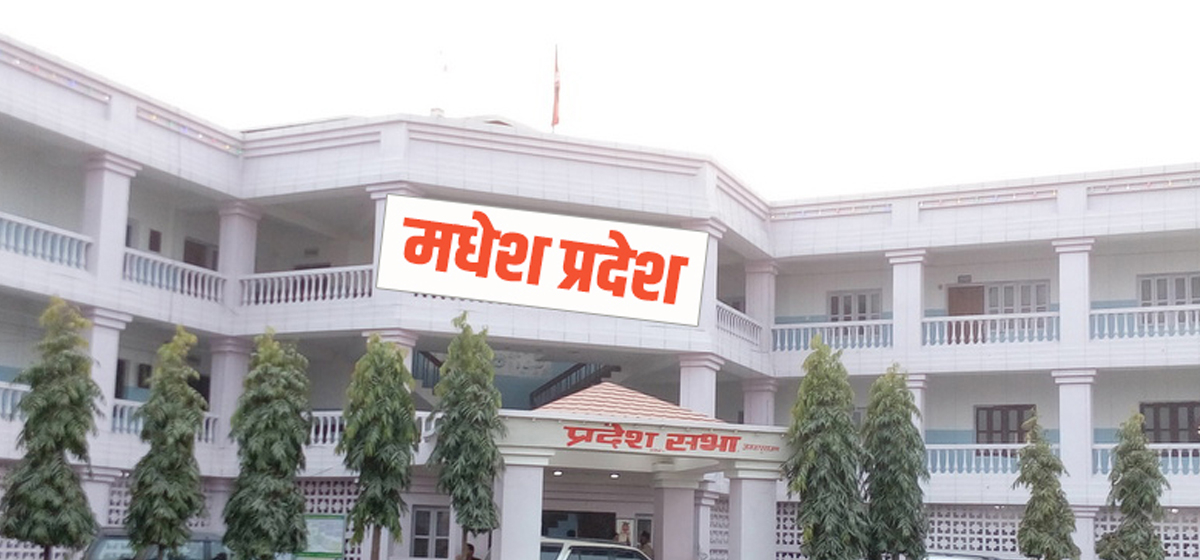
OR
US increases pressure on Saudis over writer’s disappearance
Published On: October 11, 2018 10:15 AM NPT By: Associated Press
WASHINGTON, Oct 11: President Donald Trump demanded answers Wednesday from Saudi Arabia about the fate of a missing Saudi writer as lawmakers pushed for sanctions and a top Republican said the man was likely killed after entering a Saudi consulate in Turkey.
Trump said he didn’t know what happened to Jamal Khashoggi and expressed hope that the 59-year-old writer, who went missing a week ago, was still alive. But senior members of Congress with access to U.S. intelligence reporting feared the worst.
More than 20 Republican and Democratic senators instructed Trump to order an investigation into Khashoggi’s disappearance under legislation that authorizes imposition of sanctions for perpetrators of extrajudicial killings, torture or other gross human rights violations.
While no suspects were named, and the lawmakers’ letter to the president is only a preliminary step toward taking punitive action, it marked a departure from decades of close U.S.-Saudi relations that have only intensified under Trump. Riyadh has supported the administration’s tough stance toward Iran, a key rival of Saudi Arabia in the volatile Middle East.
Republican Sen. Bob Corker, who as chairman of the Senate Foreign Relations Committee has reviewed the U.S. intelligence into what happened to Khashoggi, said “the likelihood is he was killed on the day he walked into the consulate.” He said that “there was Saudi involvement” in whatever happened with the journalist, who wrote columns for The Washington Post.
“The Saudis have a lot of explaining to do because all indications are that they have been involved at minimum with his disappearance,” Corker told The Associated Press. “Everything points to them.”
Khashoggi, a wealthy former government insider who had been living in the U.S. in self-imposed exile, had gone to the consulate in Istanbul on Oct. 2 to get paperwork he needed for his upcoming marriage while his Turkish fiancee waited outside.
Turkish authorities have said he was killed by members of an elite Saudi “assassination squad,” an allegation the Saudi government has dismissed.
The Washington Post reported Wednesday evening that U.S. intelligence intercepts outlined a Saudi plan to detain Khashoggi. The Post, citing anonymous U.S. officials familiar with the intelligence, said Saudi Crown Prince Mohammed bin Salman ordered an operation to lure Jamal Khashoggi from his home in Virginia to Saudi Arabia and then detain him.
Trump told reporters in the Oval Office that he has a call in to Khashoggi’s fiancee, Hatice Cengiz, who has appealed to the president and first lady Melania Trump for help.
Trump said he had spoken with the Saudis about what he called a “bad situation,” but he did not disclose details of his conversations. He also said the U.S. was working “very closely” with Turkey, “and I think we’ll get to the bottom of it.”
White House press secretary Sarah Huckabee Sanders said national security adviser John Bolton and presidential senior adviser Jared Kushner spoke Tuesday to Crown Prince Mohammed about Khashoggi. Secretary of State Mike Pompeo then had a follow-up call with the crown prince to reiterate the U.S. request for information and a thorough, transparent investigation.
While angry members of Congress likely won’t cause the administration to end decades of close security ties with Saudi Arabia, the initiation on Wednesday of possible sanctions under the Global Magnitsky Human Rights Accountability Act indicated the depth of concern on Capitol Hill over Khashoggi’s case. Lawmakers could also throw a wrench into arms sales that require their approval and demand the U.S. scale back support for the Saudi military campaign against Iran-backed rebels in Yemen.
Sen. Chris Murphy, D-Conn., said if Saudi Arabia had lured a U.S. resident into a consulate and killed him, “it’s time for the United States to rethink our military, political and economic relationship with Saudi Arabia.”
Sen. Rand Paul, R-Ky., a longtime critic of the Saudi government, said he’ll try to force a vote in the Senate this week blocking U.S. arms sales to Saudi Arabia. He told local radio in his home state Tuesday that he wants to end the arms shipments if there’s “any indication” the Saudis are “implicated in killing this journalist that was critical of them.”
The Saudi ambassador to Washington, Prince Khalid bin Salman bin Abdulaziz, has described the allegations as “malicious leaks and grim rumors” and said the kingdom is “gravely concerned” about Khashoggi. Saudi officials maintain he left the consulate shortly after entering, though it has failed to provide evidence to back that up, such as video footage.
Trump’s comments Wednesday were the toughest yet from his administration. The reaction from European governments has also been cautious — in part because of uncertainty over whether strained relations between Ankara and Riyadh might have colored Turkey’s reporting of events.
The Trump administration, from the president on down, is heavily invested in the Saudi relationship. That’s unlikely to change, said Robin Wright, a scholar at the Wilson Center think tank and close friend of the missing writer. The administration’s Middle East agenda heavily depends on the Saudis, including efforts to counter Iranian influence in the region, fight extremism and build support for an expected plan for peace between Israel and the Palestinians.
Indication of those stakes came within four months of Trump taking office, when Saudi Arabia became his first destination on a presidential trip and he announced $110 billion in proposed arms sales.
Crown Prince Mohammed has introduced some economic and social reforms, allowing women to drive and opening movie theaters in the deeply conservative Muslim nation. The flip side, however, is that he’s also squelched dissent and imprisoned activists. He has championed the three-year military campaign against Iran-backed Houthi rebels in Yemen that has pushed that nation toward famine and caused many civilian deaths.
Still, the Trump administration last month stood behind its support for that campaign with weapons, logistics and intelligence, certifying that the Saudis were taking adequate steps to prevent civilian deaths despite mounting evidence to the contrary.
Karen Elliott House, a veteran writer on Saudi affairs and chairwoman of the board of trustees at RAND Corp., said U.S. support for the Yemen war is likely to be the focus of congressional criticism but won’t endanger a relationship that has endured for decades, underpinned by shared strategic interests. Even under the Obama administration, which had difficult relations with Riyadh compared with Trump, there were some $65 billion in completed arms sales.
“The U.S.-Saudi relationship is certainly not about shared moral values,” House said. “It’s about shared security interests.”
You May Like This

Trump criticizes rush to condemn Saudi Arabia over Khashoggi
WASHINGTON, Oct 17: President Donald Trump Tuesday criticized rapidly mounting global condemnation of Saudi Arabia over the mystery of missing... Read More...

Saudi writer’s disappearance strains Turkey-Saudi ties
DUBAI, Oct 14: At first glance, the disappearance of journalist Jamal Khashoggi from the Saudi Consulate in Istanbul is just... Read More...

Jamal Khashoggi disappears, a mystery rattling the middle east
LONDON, Oct 8: Jamal Khashoggi, a prominent Saudi dissident, met two friends for lunch last Monday in London to discuss... Read More...





Just In
- Clash erupts between police and agitating locals in Dhanusha, nine tear gas shells fired
- Abducted Mishra rescued after eight hours, six arrested
- Forest fire destroys 13 houses in Khotang
- First meeting of Nepal-China aid projects concludes
- Lungeli appointed as Minister for Labor and Transport in Madhesh province govt
- Bus knocks down a pilgrim to death in Chitwan
- One killed in tractor-hit
- Karnali Chief Minister Kandel to seek vote of confidence today














Leave A Comment